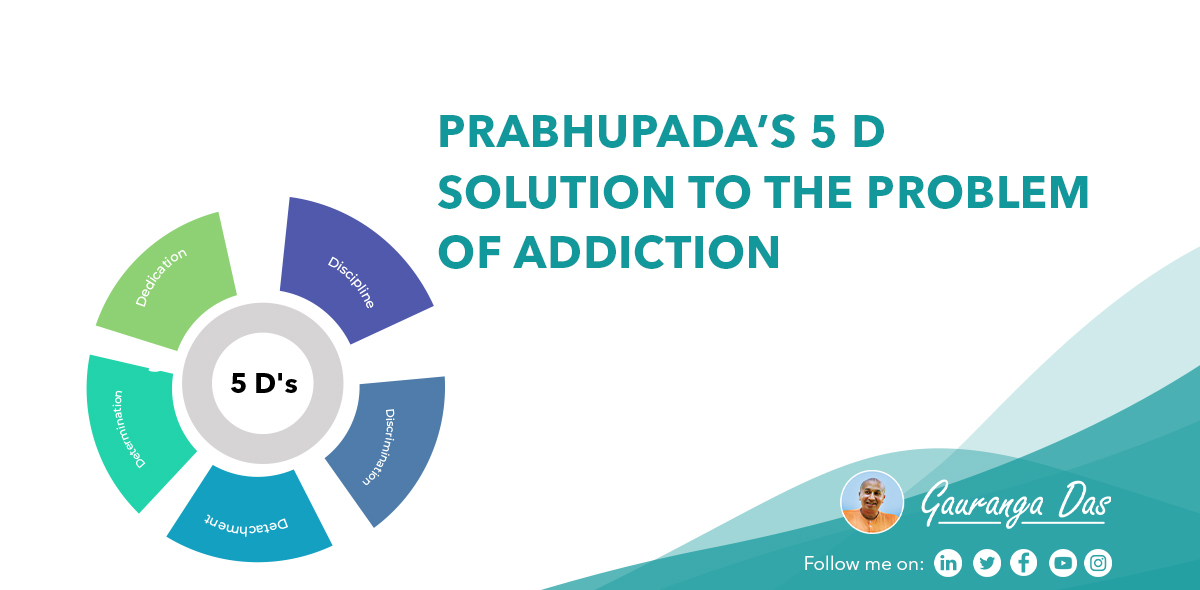It is not an easy task to help someone recover from their addictive patterns. A motivating pep talk can’t help a guy come out of smoking. It is insufficient. Such mental diseases however also have solutions that the Sage Patanjali himself delivers in his inscriptions. He writes “yoga chitta gritty nirodh.” That yoga alone can solve the problem of getting stuck in unhealthy habits. Yoga is the bonafide treatment therapy by which one can get out of this complex cycle of habits. The cyclonic storm like disturbances within the mind is called chitta vritti. The cycle of habits go at full speed like an electric fan within our minds, and Yoga simply unplugs the connection and stops the electricity from flowing through. However, the fan doesn’t instantly stop, but gradually slows down and after some time, it remains still. The word ‘nirodh’ in his statement refers to this full stop. We can infer from here that Yoga is not just different gymnastic postures. Yoga is the process of bringing the changing states of mind to stillness.
Srila Prabhupada, the Founder Ācarya of the International Society for Krishna Consciousness who revolutionised the spiritual movement in the west by turning several drug addicts and hippies in New York and San Francisco in the 60s and 70s into spiritual practitioners of Bhakti has formed a wonderful formula. It consists of 5 Ds one has to develop to gradually let go of his anarthas or contaminations of this material world and purify the consciousness to become self-realised.
Discipline
Discipline in chanting the Holy Names of the Lord regularly. You may wonder, why especially the discipline of chanting the holy names would relieve one from addictive behaviour. The ancient text of Srimad Bhagavatam states, śvādah pulkasao vāpi śuddhyeran yasya kīrtanāt ‘a dog-eater or a candāla someone lower than śudras shall be purified from chanting of the Holy Names of Narayana. As we have seen before, to break this compulsive behaviour formed over a lifetime, we compel ourselves to form a new behaviour that counteracts all material impressions by planting the seeds of transcendence within our consciousness. Lord Caitanya Mahaprabhu’s first words of siksastakam were “ceto darpana marjanam.” Now our chitta is affected by disturbances and different mental states that led to impressions, and then to actions and reactions. This Holy Name simply cleanses that dirt in the mirror of our consciousness which is hiding us from perceiving the Absolute Truth.
2. Discrimination
The first thing we lose while on the journey to the euphoric addiction is our
sense of discrimination. To regain that sense of discrimination on what is
right and wrong, healthy and unhealthy, moral and immoral we need
a substantial guide. This guide as per vedic tradition is dispersed in three
forms. Sadhu, Sanga, Shastra. A saintly person who has seen the truth, the association of people who have developed clarity in pursuing higher
purpose, and then the revealed scriptures followed by the other two.
One such bonafide Scripture, Bhagavad Gita describes you have to
overcome your material addiction with spiritual addiction.
visaya vinivartante
niraharasya dehinah
rasa-varjam raso ‘py asya
param drstva nivartate
The embodied soul may be restricted from sense enjoyment, though the taste for sense objects remains. But, ceasing such engagements by experiencing a higher taste, he is fixed in consciousness. (Bg. 2.59)
Krishna Katha is o intoxicating and provides a higher sense of pleasure that beats the pleasure of lower degrees. By engaging one’s senses in hearing and reading the scriptures, clarity is born and addiction is banished.
3. Detachment
Detachment from sense objects help us to control our senses from pursuing
them for enjoyment. This way, the pattern is disrupted. However, the best way to practice detachment is by worshipping deities. To come to the level of understanding that we are not this body-mind, we also need to acknowledge that anything available in this material world is not for our enjoyment but Krishna’s. By worshipping the deities of Krishna, we can slowly develop detachment. Because they become the centre of our lives and our needs and wants to become insignificant in front of theirs. By cooking and offering them the best palatial dishes out of love and devotion, we become detached from enjoying the sense of objects. This way, by honouring the prasadam or remnants of the Lord, our tongue is controlled. By controlling the tongue, we conquer the urges of our belly and genitals, the main residences of lust. Once lust, the biggest enemy is under control, detachment easily is achieved.
4. Determination
The fourth step towards overcoming addiction is becoming determined to break the pattern. This determination can increase by serving the devotees of the Lord. As we serve the Vaishnavas or devotees of the Lord, we also simultaneously associate with the pure devotees. By pleasing them, we immediately feel blessed with purity of consciousness that increases the vairagya determination to renounce the material attachments. Overcoming the vast ocean of material impressions samsara sagar is not so easy. Unless we get the mercy of those who already had crossed beyond it, we won’t be able to swim across this seemingly never-ending ocean.
5. Dedication
However, Devotional service cannot be stopped. If we assume that we have overcome the addictive behaviours and now it is time to give up devotional service, then we’re highly mistaken. Gita’s Verse 2.67 warns us
indriyānām hi caratām
yan many nuvidhiyate
tad asya harati prajñām
vāyur nāvam ivāmbhasi
That, “As a strong wind sweeps away a boat on the water, even one of the roaming senses on which the mind focuses can carry away a man’s intelligence.”
Increasing the dedication to this process by visiting the holy places, we absorb the higher vibrations of the great souls who had served the Lor with great dedication in that very place thousands of years ago. The grace of all those devotees flow into our consciousness and induces a sense of dedication.




